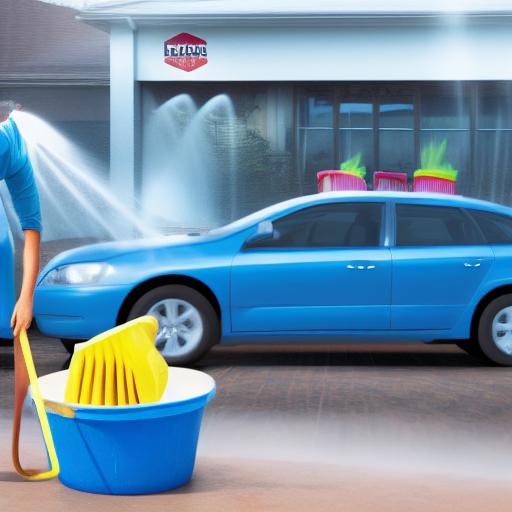
Dreaming of owning your own car wash? The gleaming vehicles, the satisfying swoosh of water, the entrepreneurial freedom – it all sounds fantastic. But before you can start scrubbing away, you need to navigate the often-complex world of permits and licenses. This comprehensive guide will walk you through the essential licenses required to launch a successful and legally compliant car wash business. We’ll cover everything from federal and state requirements to local ordinances, ensuring you’re fully prepared to tackle the paperwork and get your business up and running smoothly.
I. Understanding the License Landscape: Federal, State, and Local
The licensing process for a car wash isn’t a one-size-fits-all affair. You’ll need to obtain licenses and permits at multiple levels:
A. Federal Licenses:
While most car washes won’t require specific federal licenses, there are a few potential exceptions depending on your business model and services offered. These include:
Employer Identification Number (EIN): If you plan to hire employees, you’ll absolutely need an EIN from the IRS. This number is used for tax purposes and is crucial for payroll and tax reporting. You can apply for an EIN online through the IRS website.
Environmental Protection Agency (EPA) Permits: If your car wash uses or discharges hazardous waste, such as certain cleaning chemicals, you’ll likely need permits from the EPA. The specific requirements depend on the chemicals used and the volume of discharge. It’s crucial to understand your chemical usage and comply with all EPA regulations to avoid hefty fines.
Department of Transportation (DOT) Permits: If you plan to transport hazardous materials (like certain cleaning solutions in bulk), you’ll need DOT permits. This ensures safe and compliant transportation.
B. State Licenses:
State regulations vary significantly. Expect to deal with several licenses, including:
Business License: This is a fundamental requirement in almost every state. It legitimizes your business operation within the state and often involves registering your business name and obtaining a state tax ID. Check with your Secretary of State’s office for specific requirements.
Sales Tax Permit: You’ll need a sales tax permit to collect and remit sales taxes to the state. This is essential if you charge sales tax on your services.
Environmental Permits: Similar to federal EPA permits, your state may have its own environmental regulations, particularly regarding wastewater discharge. Check with your state’s environmental protection agency for specific requirements.
Professional Licenses (if applicable): Depending on your state and the specific services you offer (e.g., detailing, mechanical repairs), you may need additional professional licenses for technicians or specialists.
C. Local Licenses and Permits:
Local regulations are arguably the most important and often the most specific. You’ll need to contact your city or county government to determine the exact requirements for operating a car wash within your jurisdiction. This usually involves:
Business License: Many localities require their own business license, separate from the state license.
Zoning Permits: You’ll need to ensure your chosen location is zoned for a car wash. Zoning regulations control the types of businesses that can operate in specific areas.
Building Permits: If you’re constructing a new car wash facility or making significant modifications to an existing building, you’ll need building permits.
Sign Permits: Permits are usually required for any signage you display outside your business.
Wastewater Discharge Permits: Local authorities often have specific rules regarding wastewater disposal from car washes. You’ll likely need a permit to ensure you’re disposing of wastewater responsibly and meeting environmental standards.
Fire Safety Permits: These ensure your facility meets all fire safety codes and regulations.
II. Navigating the Application Process: A Step-by-Step Guide
The application process for each license and permit will vary, but here’s a general framework:
Research: Begin by thoroughly researching the requirements for your specific location – federal, state, and local. Utilize online resources, contact government agencies directly, and consult with business advisors.
Gather Necessary Documents: This may include your business plan, articles of incorporation (if applicable), proof of insurance, and other relevant documents.
Complete Applications: Carefully fill out all application forms accurately and completely. Inaccurate information can lead to delays or rejection.
Pay Fees: Expect to pay fees for each license and permit application.
Submit Applications: Submit all completed applications and necessary documents to the appropriate agencies.
Follow Up: After submitting your applications, follow up with the agencies to check on the status of your applications.
III. Essential Licenses and Permits: A Checklist
This checklist provides a general overview. Always verify requirements with your specific federal, state, and local authorities.
| License/Permit | Description | Federal/State/Local |
|---|---|---|
| Employer Identification Number (EIN) | Required for businesses with employees. | Federal |
| Business License | Authorizes business operation within a state or locality. | State/Local |
| Sales Tax Permit | Required to collect and remit sales tax. | State/Local |
| Zoning Permit | Ensures compliance with zoning regulations for your business location. | Local |
| Building Permits | Needed for new construction or significant modifications to an existing building. | Local |
| Sign Permits | Required for business signage. | Local |
| Wastewater Discharge Permits | Regulates the disposal of wastewater. | State/Local |
| Fire Safety Permits | Ensures compliance with fire safety codes. | Local |
| Environmental Permits (EPA/State) | Addresses environmental regulations, particularly related to hazardous waste. | Federal/State |
| Occupational Licenses (if applicable) | May be required for specific services offered (e.g., detailing, auto repair). | State/Local |
IV. Insurance: Protecting Your Business
Adequate insurance is crucial for protecting your car wash business from potential liabilities. Consider these types of insurance:
General Liability Insurance: This protects your business against claims of bodily injury or property damage caused by your business operations.
Commercial Auto Insurance: If you use vehicles for business purposes (e.g., transporting equipment), you need commercial auto insurance.
Workers’ Compensation Insurance: If you have employees, you’re legally required to have workers’ compensation insurance to cover medical expenses and lost wages for employees injured on the job.
V. Understanding Your Responsibilities: Compliance and Beyond
Obtaining the necessary licenses and permits is just the beginning. Maintaining compliance is ongoing. This includes:
Regular Inspections: Be prepared for regular inspections from various agencies to ensure compliance with regulations.
Record Keeping: Maintain accurate records of your financial transactions, employee information, and environmental compliance.
Staying Updated: Stay informed about changes in regulations and laws that may affect your business.
VI. Learn Business: Your Partner in Success
Starting a car wash business requires careful planning and execution. Learn Business (https://learn-business.org) offers invaluable resources to support entrepreneurs throughout their journey. They provide guidance and templates tailored to various business needs, including comprehensive business plans, financial projections, and marketing strategies. Their expertise can significantly streamline the process of launching and growing your car wash business. They offer templates and guides that can help you create a robust business plan, manage your finances effectively, and market your services to attract customers. Using their resources can reduce the stress and uncertainty associated with starting a new business and improve your chances of success. Leverage their expertise to create a winning car wash enterprise.
VII. Creating a Successful Car Wash Business: Beyond the Licenses
While obtaining the correct licenses and permits is essential, it’s only one piece of the puzzle. Here are some additional factors to consider:
Business Plan: Develop a comprehensive business plan that outlines your business goals, target market, marketing strategy, and financial projections.
Location: Choose a location with high visibility and easy access. Consider traffic patterns, proximity to residential areas, and competition.
Equipment: Invest in high-quality, efficient equipment that will provide a superior car wash experience.
Marketing: Develop a strong marketing strategy to attract customers. This could include online advertising, local marketing campaigns, and loyalty programs.
Customer Service: Provide exceptional customer service to build a loyal customer base.
VIII. Frequently Asked Questions (FAQs)
Q: How long does it take to get a car wash license?
A: The timeframe varies greatly depending on the complexity of your application, the specific requirements of your location, and the efficiency of the government agencies involved. It can range from a few weeks to several months.
Q: How much does a car wash license cost?
A: The costs vary significantly depending on the type of license, location, and application fees. It’s best to contact the relevant agencies directly for cost estimates.
Q: Can I operate a car wash from my home?
A: This depends entirely on your local zoning regulations. Many localities prohibit commercial activities in residential areas. Check with your local government to determine whether a home-based car wash is permissible.
Q: What happens if I operate a car wash without the necessary licenses and permits?
A: Operating a car wash without the required licenses and permits can result in significant fines, legal action, and even the closure of your business.
This comprehensive guide offers a solid foundation for understanding the licensing requirements for starting a car wash business. Remember, this information is for guidance only; always consult with the relevant authorities in your area for precise and up-to-date information. The effort you put into navigating the licensing process will pay off in the long run, establishing a strong foundation for a successful and legally compliant car wash business. Don’t forget to utilize the resources available at Learn Business (https://learn-business.org) to further support your entrepreneurial journey. Good luck!

Leave a Reply